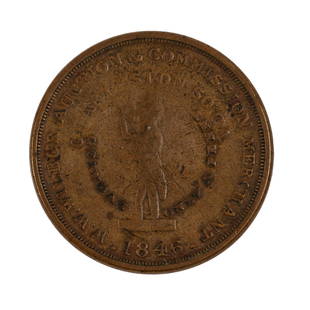
[Business, Industry & Finance] Ward, Samuel, Jr. Extensive Archive Related to Samuel Ward, Jr.
Similar Sale History
View More Items in Coins, Currency & Stamps![[Americana] Smith, Samuel The History of the Colony of Nova-Caesaria, or New-Jersey...: [Americana] Smith, Samuel The History of the Colony of Nova-Caesaria, or New-Jersey... Burlington, in New-Jersey: Printed and sold by James Parker, Sold also by David Hall, in Philadelphia, 1765. Firs](https://p1.liveauctioneers.com/65/259470/135047471_1_x.jpg?height=310&quality=70&version=1661539042)
Related Coins, Currency & Stamps

More Items in Coins, Currency & Stamps
View MoreRecommended Collectibles
View More
![[Business, Industry & Finance] Ward, Samuel, Jr. Extensive Archive Related to Samuel Ward, Jr.](https://p1.liveauctioneers.com/65/275517/144719976_1_x.jpg?quality=1&version=1673808587&width=486)
![[Business, Industry & Finance] Ward, Samuel, Jr. Extensive Archive Related to Samuel Ward, Jr.](https://p1.liveauctioneers.com/65/275517/144719976_1_x.jpg?quality=80&version=1673808587)
Item Details
Description
Extensive Archive Related to Early Prominent New York Stockbroker and Land Speculator, Samuel Ward, Jr.
Locations vary, ca. 1787-1815. Archive of approximately 127 printed and manuscript documents, comprising 83 letters, 16 contract agreements, 13 receipts, seven payment orders, and eight statements of land transfer, all related to Samuel Ward, Jr. (1756-1832), his mercantile firm, Samuel Ward and Brother, other business ventures of his, as well as numerous professional and personal associates of his of the late 18th and early 19th centuries. Notable signatures include: Nathaniel Prime (1768-1840), early stockbroker; William Constable (1752-1803), merchant; James Greenleaf (1765-1843), financier and land speculator; John Brown (1736-1803), Rhode Island Congressman; Comfort Sands (1738-1834), New York statesman; William Greene, Jr. (1731-1809), Rhode Island Governor; Daniel Crommelin (1741-1808), merchant; Alexander Macomb (1748-1831), merchant and speculator; Richard Harison (1747-1829), New York Attorney General; Sir William Pulteney (1729-1805), British politician and land speculator; Daniel Ludlow (1750-1840), banker. The archive references several important individuals such as Nathanael Greene, Aaron Burr, Robert Morris, Rufus King, the Marquis de Lafayette, William Duer, Henry Knox, Nathanael Gorham, John Nicholson, William S. Smith, John Pintard, Daniel McCormick, John J. Angerstein, Pierre Chassanis, and many more. Condition varies, most with contemporary folds, toning, and tears. Full list of documents with descriptions available upon request.
Samuel Ward, Jr. was a merchant, land speculator, and veteran of the Continental Army. He served in a number of notable conflicts as Lieutenant Colonel of the 1st Rhode Island Regiment and was a prisoner of war before being decommissioned in 1781. He was the son of Samuel Ward, Sr. (1725-1776), a prominent judge, Colonial Governor of Rhode Island and Providence Plantations, and a Rhode Island delegate to the Continental Congress. After the Revolution, the younger Ward went into business as a merchant based out of Warwick, Rhode Island, was selected as a delegate to the Annapolis Conference of 1786, and moved to New York City in 1790 where he established the firm Samuel Ward and Brother. He remained in or around that city for the remainder of his life. This archive touches on all aspects of Wards post-war life, including his vast dealings in stock trading, land speculation, and merchant trading.
Of note are documents highlighting Ward's extensive trading of U.S. bank stocks in the early years of what would become the New York Stock Exchange, ca. 1792-98. Ward traded shares in several recently-formed banks, such as The First Bank of the United States, The Bank of North America, and the non-federal Bank of New York--among the first stocks traded on this early market. These papers also highlight Ward's long relationship to prominent New York broker and banker Nathaniel Prime, as well as to Daniel Ludlow, Gulian Verplanck, and others. Prime, author of a number of letters in the archive, founded Nathaniel Prime, Stock and Commission Broker, in 1796--one of the first public traders of bank stocks on Wall Street in New York City. Of particular note is a leaf from Prime's company account ledger outlining some of his first transactions with Ward, in 1792. In 1808 Prime brought in Ward's son, Samuel Ward III (1786-1839), as a partner in his brokerage firm, which would became Prime and Ward.
Another group of documents deal with Ward's involvement in the sale of lands in the state of New York. As a result of the peace negotiations at the conclusion of the American Revolution the State of New York was given millions of acres of land on its western frontier, formerly occupied by the British Crown and its Native American allies. In order to attract settlers, as well as to balance longstanding war debts, the New York State government authorized the sale of a large portion of this land. In 1791, he invested in a vast amount of this land through his relationship with businessman, tea merchant, and Continental Army veteran, William Constable. Constable, along with Alexander Macomb--a wealthy fur trader and shipping magnate--and Daniel McCormick (1740-1834) purchased 3,635,200 acres of this New York land at 8 pence per acre. This enormous sale, later dubbed "Macomb's Purchase”, made the three men owners of almost one eighth of the entire state. They quickly set out to find buyers to recoup their investment, and Samuel Ward purchased 1,000,000 acres from Constable. Ward then sold 210,000 of those acres to James Greenleaf, a speculator from Boston. Ward, Constable, and Greenleaf then made trips to Europe to sell tracts of this land to foreign nationals in England, France, and the Netherlands. Many of the documents mention potential investors from powerful European firms such as Lane Son and Frazer, in England; Daniel Crommelin and Sons, in the Netherlands; and a French group referred to as "La Companie de New York." The French Revolution casts a shadow over several of the letters between Ward and Constable, and in one, dated September 1, 1793, Constable shares the unfortunate news regarding a former investor: "...Dr. Grigorie of Dunkirk is guillotined-He had property of ours in his hands which I am afraid may be confiscated..."
Many documents dating to the mid-1790s relate to Ward and his associates' interest in the then-contested and hotly coveted borderlands of western Georgia, which would come to be called the "Yazoo Land Scandal," where speculators and state politicians attempted to sell parcels of land not yet technically part of the United States. Much like New York, Georgia's territorial boundaries greatly changed following the Revolution. The state claimed a large portion of land in its western territory which was then occupied by Native Americans, and also contested by Spanish Florida. Due to those claims, the Federal government opposed the sale of any of the land, yet several speculators and members of the Georgia state legislature saw an opportunity to make a fortune. In 1789, the state attempted to sell 20,000,000 acres of land to multiple land companies but the deal fell through when buyers tried to settle with depreciated currency. In 1794, a number of new companies were founded with the same purpose, such as the Georgia Company (often mentioned in the archive), the Georgia-Mississippi Company, and the Upper Mississippi Company. All had influential patrons who were bribed with company shares in exchange for favorable legislation regarding future land sales, including Georgia Senator James Gunn (1753-1801), Supreme Court Justice James Wilson (1742-1798), as well as multiple Georgia state Congressmen. On January 7, 1795, Georgia Governor George Matthews authorized the sale of 40,000,000 acres of western land, later known as the Yazoo Act, taking its name from the Native American nation that once settled the area. When details of the corruption and inside deals became known-dubbed the "Yazoo Land Scandal"-members of the public became outraged, and action was taken to nullify the sales within a year. The matter was not at an end however, as many individuals still laid claim to tracts of land, and sought to resolve the issues through litigation. The last Yazoo-related case would not be settled in the American courts until 1816.
One incident of note frequently mentioned in this archive involves a land sale gone awry between Ward-Constable and prominent English businessman John J. Angerstein (1735-1823). Due to laws against non-citizens owning property within the United States, American agents in Europe found their efforts hindered when attempting to sell the New York land to foreign nationals. Aaron Burr--then a Senator from New York--was an associate of Constable's and found a loophole in the laws: aliens could not own land but could still own a mortgage on property and foreclose as successfully as a citizen. With this knowledge, Ward and Constable pitched the sale to Angerstein with the stipulation that Ward would use his political connections in the United States to change legislation so Angerstein could own the land outright, and in December of 1792 they finalized the sale of 200,000 acres. According to their agreement, if legislation did not pass, Constable agreed to purchase Angerstein's tract in his stead, repay him his initial payment with interest, and receive the title. However, Ward did not attempt to have any law passed as he was aware that such legislation was recently struck down in the New York Assembly. Using his power of attorney Ward sold Angerstein's promised tract to Aaron Burr and James Greenleaf. Angerstein was promised payment from this sale, but only if the notes of Burr and Greenleaf were honored for their original endorsement. Four years later, in 1796, Greenleaf defaulted on the note payable to Angerstein due to other debts he had at the time, and Angerstein filed a lawsuit against him and Burr. Angerstein employed New York lawyer Daniel McKinnon, to whom Alexander Hamilton served as counsel at the time. Also included in the archive is an annotated draft in multiple hands--as well as a final copy--of Ward's testimony given to Hamilton regarding these events. Angerstein was ultimately successful in his litigation against Ward, Burr, and Greenleaf. The entire affair is cited as one of the causes of ill feeling between Hamilton and Burr that would culminate in their fateful duel in 1804.
Miscellaneous documents that round out the archive highlight: trade between Ward's merchant firm Samuel Ward and Brother, European wholesale suppliers, and New York based artisans; the contentious settlement of the estate of Major General Nathanael Greene (1742-1786), who died in debt, and of whom Ward was a lifelong friend and one of Greene's executors; Ward's correspondence with family members.
A unique and fascinating archive exploring the new world of merchants, stocks, and land speculation in the early years of the American Republic.
Buyer's Premium
- 31% up to $600,000.00
- 26% up to $4,000,000.00
- 20% above $4,000,000.00
[Business, Industry & Finance] Ward, Samuel, Jr. Extensive Archive Related to Samuel Ward, Jr.
Shipping & Pickup Options
Item located in Philadelphia, PA, usPayment

Auction Curated By





















![[Business, Industry & Finance] [Panic of 1792] The Concern of William Duer, Alexander Macomb & Isaac: [Business, Industry & Finance] [Panic of 1792] The Concern of William Duer, Alexander Macomb & Isaac Whippo in Account Current with Francis Ingraham Contemporary Account Ledger Related to the Panic of](https://p1.liveauctioneers.com/65/275517/144719974_1_x.jpg?height=310&quality=70&version=1673808587)



![[NATIVE AMERICANS]. Archive of documents related to: [NATIVE AMERICANS]. Archive of documents related to Assiniboine, Arapaho, and Northern Cheyenne tribal affairs, incl. delegation documents. Approximately 20 documents including personal letters addres](https://p1.liveauctioneers.com/197/224021/115492047_1_x.jpg?height=310&quality=70&version=1635379320)
















![[TOKENS - MAGIC]. Group of two Books on Magicians Tokens. ...: [TOKENS - MAGIC]. Group of two Books on Magicians Tokens. Includes: FINDLAY, James B. (1904 - 1973). Conjurers Coins and Medals. England: Author, 1964. Publisher’s full maroon cloth, font board](https://p1.liveauctioneers.com/928/329228/177514451_1_x.jpg?height=310&quality=70&version=1715272280)































![George Washington Signed Discharge: Partly printed discharge document signed by George Washington, as Commander in Chief of the Armies of the United States. Newburgh, [New York], 4 January 1783. 1 page, ## x ## in. Undersigned by Washin](https://p1.liveauctioneers.com/7226/322253/173251475_1_x.jpg?height=310&quality=70&version=1710004847)
![[Ambrotype] Texas Confederate Soldier: Sixth plate ambrotype. Full leatherette case. Portrait of a possible Texas Confederate soldier. A silver star device was used to pin up the brim of his light-toned headgear, a look often seen in image](https://p1.liveauctioneers.com/7226/322253/173251509_1_x.jpg?height=310&quality=70&version=1710004847)


![Captured Bowie Knife w/ Period Note of Provenance: Captured Confederate D-hilt Bowie knife. [Kenansville, North Carolina]: [Louis Froelich factory]. With original metal and leather sheath with affixed period notes. First note with only remnants. Secon](https://p1.liveauctioneers.com/7226/325455/175169154_1_x.jpg?height=310&quality=70&version=1712370394)
